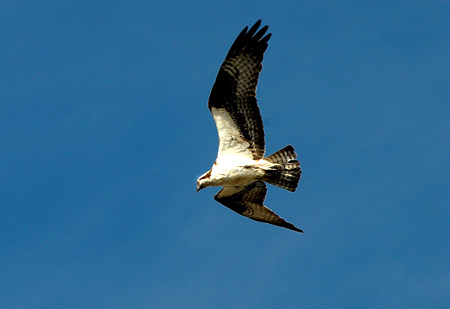Fishing Like an Ospreyby David Krohne |
| Printer-friendly version | Email this article |
 I hadn’t turned a fish in more than an hour. I hadn’t turned a fish in more than an hour. All afternoon I’d coaxed browns and cutthroats from under cut banks and deep runs with a gaudy grasshopper imitation. But that shut down as the wind died and an evening cool settled on the Gallatin. Now an osprey was fishing the shallow riffle just upstream from me. It was fishing in earnest, making pass after pass, looking hard, hovering now and then. Ospreys know the river better than we can. When a mayfly hatch begins and fish move into the shallow riffles to eat despite the danger from above, the ospreys know. And now I knew. Upstream and into the sun, backlit mayflies rose by the thousands from the water. Ospreys fish in the narrow sense. They’re pros because for them it’s not a game. Still, it’s not just expertise, it’s a specialized focus. Eagles eat anything—fish they snatch from a riffle, a dead deer in the meadow, a duck that moves too slowly. But osprey fish—no more and no less. I’ve fished in the narrow sense—not professionally and not for food and life or death, but I’ve fished with that single-minded focus. Every once in a while I take off for four or five days to really fish. Somewhere on the way I buy a loaf of bread, a jar of peanut butter, a gallon of milk, and a six-pack of beer. And I fish. I fish 10 or 11 hours a day. I eat PB three times a day, washed down by the appropriate beverage. And when I go to sleep at night I can still feel the push of water against my legs and the momentary panic you feel when you’ve lost sight of the fly in the sun glare on the water. I relive each “take,” the moment I’ve fooled a fish—the only moment I really care about. I don’t land a lot of fish I should catch because I lose interest after the take. The day may come when I fish with hookless flies so I don’t lose time fighting fish after the key moment has passed. One week earlier, I’d been with David Hadley’s freshman tutorial group on their immersion trip to Montana—Fly Fishing: The Liberal Art. The goal was fly fishing in the broad sense. Hadley took fly fishing, inarguably recreation, and embedded it in a context that was intellectual and academic: stream ecology, Western water politics and economics, hydrology, geology, fire management policy, trout behavioral ecology, literature. Each immersion trip has that scene that sticks with you: On the evening after the first day’s fishing we sat together in a diner and went around the table telling fish stories. Twelve students, each with a story: fish missed, big fish, fish so small they flew by as the hook was set, fish lost, the tension as a fish glides toward a dry fly, the unrelenting focus on a strike indicator. Hadley and Aus Brooks and I just sat back and listened, knowing they had fished in the narrow sense. And on the best immersion trips there is a time you remember because it signals a different level of success. That memory formed on the van ride up the Yellowstone from Livingston to Gardiner. When we’d arrived in Bozeman five days before, the conversation in the van centered on high school girlfriends, sports, funny billboards, and novel brands of gas and fast food. But on the drive up the Yellowstone, all that was interspersed with serious conversation about center pivot irrigation, head gates, dry creeks, trout habitat, the ethics of catch and release fishing, current seams in the Yellowstone, and what really happened to Paul in A River Runs Through It. They had begun to fish in the broad sense. All this, I think, speaks to the liberal arts. We’re talking much these days on this campus about interdisciplinary work. Sometimes it seems we talk about it like we discovered the concept and invented the word just last year. But the liberal arts, at least as practiced in my three decades in the Wabash culture, are inherently interdisciplinary. We embed serious work in a discipline in a matrix of connections to other fields. We give our students the freedom to choose which of those connections to follow. The beauty of Hadley’s tutorial was that it modeled, in just a few days, the process of finding those connections. His students did not become liberally educated in a week; that’s the work of a lifetime. But they did begin to see the matrix, the concept that fishing in the broad sense includes work in political science, and economics, and ethics, and history, and biology, and literature. But they also learned another crucial lesson—that you can’t fish in the broad sense until you’ve fished like an osprey. Photo by David Krohne
|
